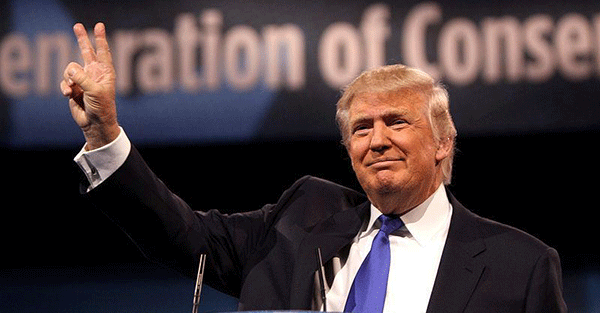
Fault lines: GOP civil war deepens … Donald Trump is poised to breeze through another round of primary contests this week — while the Republican Party splinters around him. Trump’s ascent to the top of the GOP, which was capped last week with Ted Cruz’s devastating loss in the Indiana primary, happened so fast that even the billionaire himself was surprised. And the whipsawed party establishment now faces immediate choices – none of which particularly appeal to them. -CNN
This CNN analysis, like so many in the mainstream media, gets at least part of its analysis wrong. The Republican Party hasn’t splintered.
There never was a “party.”
What was presented by the mainstream media as a party was simply a manipulated coalition of individuals willing to present themselves in certain ways to provide a convenient political institution.
The Republican Party contains a quasi-libertarian element along with a “conservative” and “fundamentalist” element. There was absolutely no similarity between these groups except that they were necessary to fill out the “big tent.”
The Democratic Party is no more real than the Republican one.
The Democrats included sincere, anti-corporate socialists alongside of calculating globalists who regularly used government and multinational power to extend the US empire.
Both “parties” contained components absolutely opposed to each other. But such an embrace of disparate pieces was necessary to create and maintain the “two party” system.
What Trump has done is bifurcate one of these parties. He has consolidated parts that represent the country’s sensible foundation.
The most ancient elements of the Republican Party revolve around Jeffersonian liberalism – agrarian republicanism in other words.
The Democratic Party, at its core is Hamiltonian mercantilism.
Both parties have been assiduously expanded so that the roots are not visible.
But the split between Republicans and Democrats is also Jefferson versus Hamilton.
Jeffersonian agrarianism is easily the more credible philosophical structure.
It presented the farmer as citizen and statesman, an individual who exercised personal human action on behalf of himself, his family and his community. (Slavery is a topic for another time.)
Hamilton’s mercantilism didn’t really anchor a culture. Mercantilism, as always, is a tool of those who seek wealth and power.
These who adopt it are usually singular – and even sociopathic – individuals who are eager to take advantage of sociopolitical and economic structures to advance their own interests.
Hillary is a quintessential Hamiltonian, a mercantilist manipulator who pretends to be an urban populist when she is actually an emissary of the Western monetary elite that controls much of the world including the US.
It is this monetary elite that has created the two party structure the US has today. And surely they created it to blur the profile of Jeffersonian agrarianism, which they abhorred.
Now that we have described Trump’s impressive accomplishment – tapping America’s slumbering Jeffersonian subconscious – we need to examine some of its more questionable elements.
First a restatement and elaboration: The core of Trump’s appeal is Jeffersonian and consists of opposition to unnecessary foreign wars and “free trade” treaties along with an emphatic enforcement of borders.
On many other issues, Trump is certainly no libertarian and has made unfortunate statements regarding his enthusiasm for federal power.
But the basics of his message reverberate through history. People always want to secure their own cultures because otherwise they have no place to live. Americans are no different.
Here are the questions:
– Uber-elitist George Soros is behind a good deal of the Trump opposition, yet Trump has had a long term business relationship with Soros. Are there deeper currents and darker motivations swirling about the Trump campaign?
– Is it possible, even accidentally, that the Trump campaign is creating a Hispanic and Mexican backlash that may eventually bring both countries closer together in a number of ways? Ironically, Trump’s main platform position seeks to institute firmer official divisions between the two countries.
– How has it been possible for the Trump campaign to attract so much media coverage? Obviously there has been an affirmative decision to provide Trump with endless barrels of ink. On the other hand, starving Trump of coverage might have crushed his campaign early on.
-Why have there been seemingly credible reports that Trump never wanted to win the presidency or even the nomination? These reports maintain he only embarked on the process to make his opinion heard and expand his personal and business profile. Given this perspective, will Trump actually follow through with his stated beliefs if he does win the nation’s highest office?
– Is it a good thing that Trump has almost single-handedly revived the US political process, at least on the federal level? In fact, from a libertarian standpoint (certainly an anarchical one), reinforcing political activism is actually a step back toward communal powerlessness rather than individual activism.
Year after year and decade after decade, modern democracy runs along the lines of Hamiltonian mercantilism no matter who is in power. It is very unlikely that Trump’s Jeffersonian approach, limited though it is, can make a significant impact, even if he is actually elected.
Of course, we hope and wish otherwise.
Conclusion: Modern “democratic” politics are intended to provide the impression of control without the substance. The real control that most people have involves personal and professional power aimed at affecting one’s immediate social and cultural milieu.
